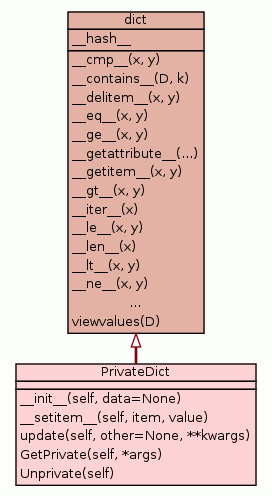
| Trees | Indices | Help |
|
|---|
|
|

A dictionary that turns its values to private fields.
>>> PrivateDict() {} >>> supersekkrit = PrivateDict({"password": "foobar"}) >>> print supersekkrit["password"] <password> >>> supersekkrit["password"].Get() 'foobar' >>> supersekkrit.GetPrivate("password") 'foobar' >>> supersekkrit["user"] = "eggspam" >>> supersekkrit.Unprivate() {'password': 'foobar', 'user': 'eggspam'}
|
|||
new empty dictionary |
|
||
|
|||
| None |
|
||
|
|||
| dict |
|
||
|
Inherited from Inherited from |
|||
|
|||
|
Inherited from |
|||
|
|||
|
Inherited from |
|||
|
|||
x.__init__(...) initializes x; see help(type(x)) for signature
|
x[i]=y
|
Update D from dict/iterable E and F. If E present and has a .keys() method, does: for k in E: D[k] = E[k] If E present and lacks .keys() method, does: for (k, v) in E: D[k] = v In either case, this is followed by: for k in F: D[k] = F[k]
|
Like dict.get, but extracting the value in the process. Arguments are semantically equivalent to ``dict.get`` >>> PrivateDict({"foo": "bar"}).GetPrivate("foo") 'bar' >>> PrivateDict({"foo": "bar"}).GetPrivate("baz", "spam") 'spam' |
Turn this dict of Private() values to a dict of values. >>> PrivateDict({"foo": "bar"}).Unprivate() {'foo': 'bar'}
|
| Trees | Indices | Help |
|
|---|
| Generated by Epydoc 3.0.1 on Mon Aug 22 11:13:34 2016 | http://epydoc.sourceforge.net |